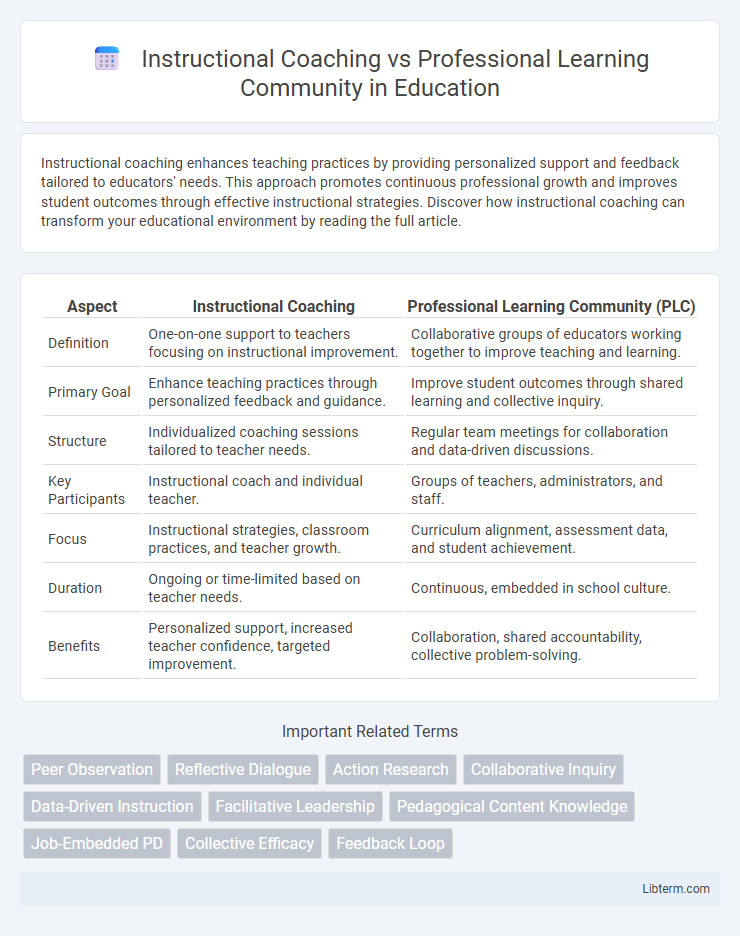Instructional coaching enhances teaching practices by providing personalized support and feedback tailored to educators' needs. This approach promotes continuous professional growth and improves student outcomes through effective instructional strategies. Discover how instructional coaching can transform your educational environment by reading the full article.
Table of Comparison
| Aspect | Instructional Coaching | Professional Learning Community (PLC) |
|---|---|---|
| Definition | One-on-one support to teachers focusing on instructional improvement. | Collaborative groups of educators working together to improve teaching and learning. |
| Primary Goal | Enhance teaching practices through personalized feedback and guidance. | Improve student outcomes through shared learning and collective inquiry. |
| Structure | Individualized coaching sessions tailored to teacher needs. | Regular team meetings for collaboration and data-driven discussions. |
| Key Participants | Instructional coach and individual teacher. | Groups of teachers, administrators, and staff. |
| Focus | Instructional strategies, classroom practices, and teacher growth. | Curriculum alignment, assessment data, and student achievement. |
| Duration | Ongoing or time-limited based on teacher needs. | Continuous, embedded in school culture. |
| Benefits | Personalized support, increased teacher confidence, targeted improvement. | Collaboration, shared accountability, collective problem-solving. |
Understanding Instructional Coaching
Instructional coaching centers on personalized, one-on-one support aimed at enhancing teachers' instructional strategies through observation, feedback, and reflective practice. Unlike Professional Learning Communities (PLCs), which emphasize collaborative group problem-solving and shared learning goals, instructional coaching provides tailored guidance to meet individual educators' needs. This approach fosters continuous professional growth by addressing specific classroom challenges and promoting effective teaching techniques.
Defining Professional Learning Communities
Professional Learning Communities (PLCs) are structured groups of educators who collaborate regularly to improve teaching practices and student outcomes through shared goals, data analysis, and collective problem-solving. Unlike Instructional Coaching, which provides individualized support and feedback from a coach to a teacher, PLCs foster a collective responsibility for student learning across a team or school. Key elements defining PLCs include continuous collaboration, a focus on student learning, and a commitment to using evidence-based strategies to drive instructional improvement.
Core Objectives of Instructional Coaching
Instructional coaching centers on personalized teacher support to enhance instructional practices, targeting specific classroom strategies and student outcomes. Core objectives include fostering reflective teaching, promoting data-driven instruction, and facilitating continuous professional growth through one-on-one collaboration. This approach contrasts with Professional Learning Communities, which emphasize collective teacher collaboration for curriculum and school-wide improvements.
Key Principles of Professional Learning Communities
Professional Learning Communities (PLCs) emphasize collaborative teams, collective inquiry, and a continuous cycle of improvement centered on student learning, fostering shared responsibility among educators. Key principles include a focus on results-driven practices, regular collaboration, and reflective dialogue aligned with school goals to enhance instructional effectiveness. Instructional Coaching, in contrast, provides individualized support, targeting specific teacher growth through coaching cycles but integrates within PLCs to reinforce professional development.
Benefits of Instructional Coaching for Educators
Instructional coaching provides personalized, one-on-one support that targets specific teacher needs and instructional goals, enhancing teaching strategies more effectively than group-based professional learning communities. This individualized approach fosters deeper reflective practice and instant feedback, accelerating professional growth and improving classroom outcomes. Educators benefit from tailored resources and ongoing mentorship, resulting in increased confidence and sustained instructional improvements.
Advantages of Professional Learning Communities
Professional Learning Communities (PLCs) enhance collaborative teaching by fostering continuous shared learning and reflection among educators, leading to improved instructional strategies and student outcomes. PLCs promote a culture of collective responsibility and support, enabling teachers to address challenges collectively and tailor interventions based on diverse insights. This collaborative model increases teacher engagement, professional growth, and sustained school-wide improvement compared to isolated instructional coaching.
Instructional Coaching vs Professional Learning Community: Key Differences
Instructional coaching centers on individualized, one-on-one support for teachers to improve specific instructional strategies, while Professional Learning Communities (PLCs) emphasize collaborative group work aimed at shared goals and collective inquiry among educators. Coaches provide tailored feedback and modeling in real-time classroom settings, contrasting with PLCs' structured meetings for data analysis, curriculum planning, and peer discussions. The key difference lies in instructional coaching's personalized mentorship versus PLCs' collaborative problem-solving to enhance overall teaching practices.
Integrating Instructional Coaching and PLCs for School Improvement
Integrating Instructional Coaching and Professional Learning Communities (PLCs) enhances school improvement by fostering continuous teacher development and collaborative problem-solving. Instructional Coaching provides personalized, job-embedded support tailored to individual teacher needs, while PLCs promote collective inquiry and shared goals among educators. Combining these approaches cultivates a culture of reflective practice, data-driven decision-making, and sustained instructional excellence.
Challenges and Limitations in Each Approach
Instructional coaching faces challenges including time constraints for personalized support and varying coach-proficiency levels, which can limit consistent impact across classrooms. Professional learning communities often struggle with issues such as group dynamics, unequal participation, and difficulty sustaining collaboration without administrative support. Both approaches encounter limitations in scaling effectively while maintaining high-quality, targeted professional development.
Choosing the Right Model for Your School’s Needs
Instructional coaching offers personalized, one-on-one support tailored to individual teacher growth, while professional learning communities (PLCs) emphasize collaborative team-based learning and shared accountability. Schools with diverse teacher experience levels may benefit from instructional coaching to address specific skill gaps, whereas those seeking to foster collective efficacy and school-wide culture improvement might prioritize PLCs. Evaluating factors such as school size, existing collaboration culture, and targeted outcomes will guide administrators in selecting the optimal model to enhance instructional quality and student achievement.
Instructional Coaching Infographic

 libterm.com
libterm.com